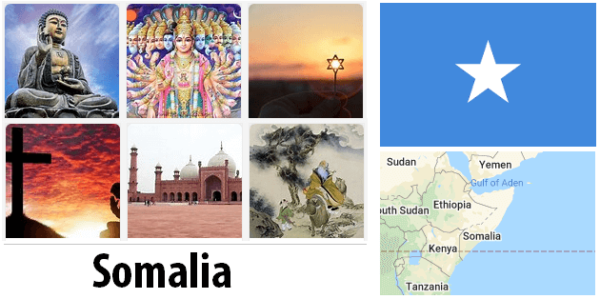The region of Somalia was called by the Egyptians “Land Punt” and there was a lively trade relationship between the two countries. Centuries later, the Romans called the country the “land of aromas” when it was there that the incense originated. This ancient trade tradition was reinforced in the 8th century when Arab refugees set up several trading stations on the Somali coast.
According to thesciencetutor, Somalis were Islamized and led by immigrants from Yemen. In the 13th century, they formed the Kingdom of Ifat with Zeila as its capital. Ifat initially paid taxes to the Ethiopian empire, but quickly clashed with the Abyssins, expanded its territory and changed its name to the Sultanate of Adal.

The country was now developing a comprehensive trade that was in close contact with the Arab markets and to the south with the Zandj coast. At the same time, the Sultans sought to expand the state at the expense of the Ethiopian empire. The conflict had religious undertones at the same time, which is why the Ethiopian rulers of 1439 asked for the help of Christian Europeans. Yet, it was not until 1541 that the Portuguese government sent a fleet – having learned the trade in the Indian Ocean, and acknowledged that it would make sense to monopolize it. Backed by an Ethiopian army, the navy completely ravaged the city of Zeila, then destroyed Mogadishu (Muqdisho), Berbera and Brava.
The destruction was not followed by an effective occupation. Yet the presence of the Portuguese navy hampered the rebuilding of the region’s economy. The Sultanate Adal decayed and was divided into a number of smaller sultanates, the northernmost of which was under the influence of Egypt, which was once again subject to the Ottoman Empire, while the southerners were attached to the sultanate of Zanzibar – after the Portuguese were ousted in 1698.
The Suez Canal gave new strategic significance to the “Horn of Africa”. In 1862, the French bought the port city of Obock, which later became the present Djibouti. The Italians settled in Aseb (Ethiopia), and in 1869 they continued into Eritrea, while the British in 1885 conquered the Egyptian possessions of Zeila and Berbera. In compensation for his defeat to Ethiopia, in 1906 Italy gained the southern coast of Somalia.
The opposition to foreign domination was particularly evident in the British colony, where sheik Mohamed bin Abdullah Hassan organized a revolutionary Islamic movement that on four occasions defeated the colonial power in the period 1900-04. It was not until 1920 that the British got the area under control, and only then by deploying the Air Force – for the first time in Africa.
After World War II, the Somali Youth Club was formed, the goal of which was independence and national assembly. In 1960, the British and Italian territories became independent, and in July they joined together in the Somali Republic. The new state gained parliamentary rule that lasted until October 21, 1969, when a group of officers led by General Siad Barre took power, declared the country socialist and allied with the Soviet Union.
In July 1976, Somalia invaded the Ethiopian Ogaden Desert, on the pretext of helping the Front to liberate Western Somalia. The Ethiopian army, with the support of Cuban forces and with the sympathy of most African states, fought back the invasion. As a result, Somalia cut off diplomatic relations with Cuba and terminated the military agreements with the Soviet Union.
The war on Ethiopia, the rise in prices of oil and basic food, and the drought of 1978-79 brought the country to the brink of chaos. In April, a group of officers tried unsuccessfully to conduct a coup against Barre. In October 1980, Barre declared the country in a state of emergency, restoring the Supreme Revolutionary Council, which had been closed down in 1976.
Somalia previously claimed territorial claims against Kenya, whose northeastern province is perceived as Somali territory, but from 1984 relations improved after the conclusion of trade and technical cooperation agreements. However, new problems arose in relations with Ethiopia due to the controversy over Ogaden and the massive influx of Ethiopian refugees into Somalia – 840,000 in 1988.
Barre was elected president in 1986 with 99% of the vote. In February 1989, Prime Minister Ali Samater traveled to London and Washington to publish a comprehensive amnesty for 400 political prisoners.
But with the end of the Cold War, Somalia lost strategic importance to the United States, reducing its credits and investments. At the same time, Saudi Arabia almost completely stopped its cattle purchases. In January 1991, the opposition formed the United Somali Congress (USC) and overthrew the president. He was replaced by USC leader Ali Mahdi Mohammed and businessmen.
